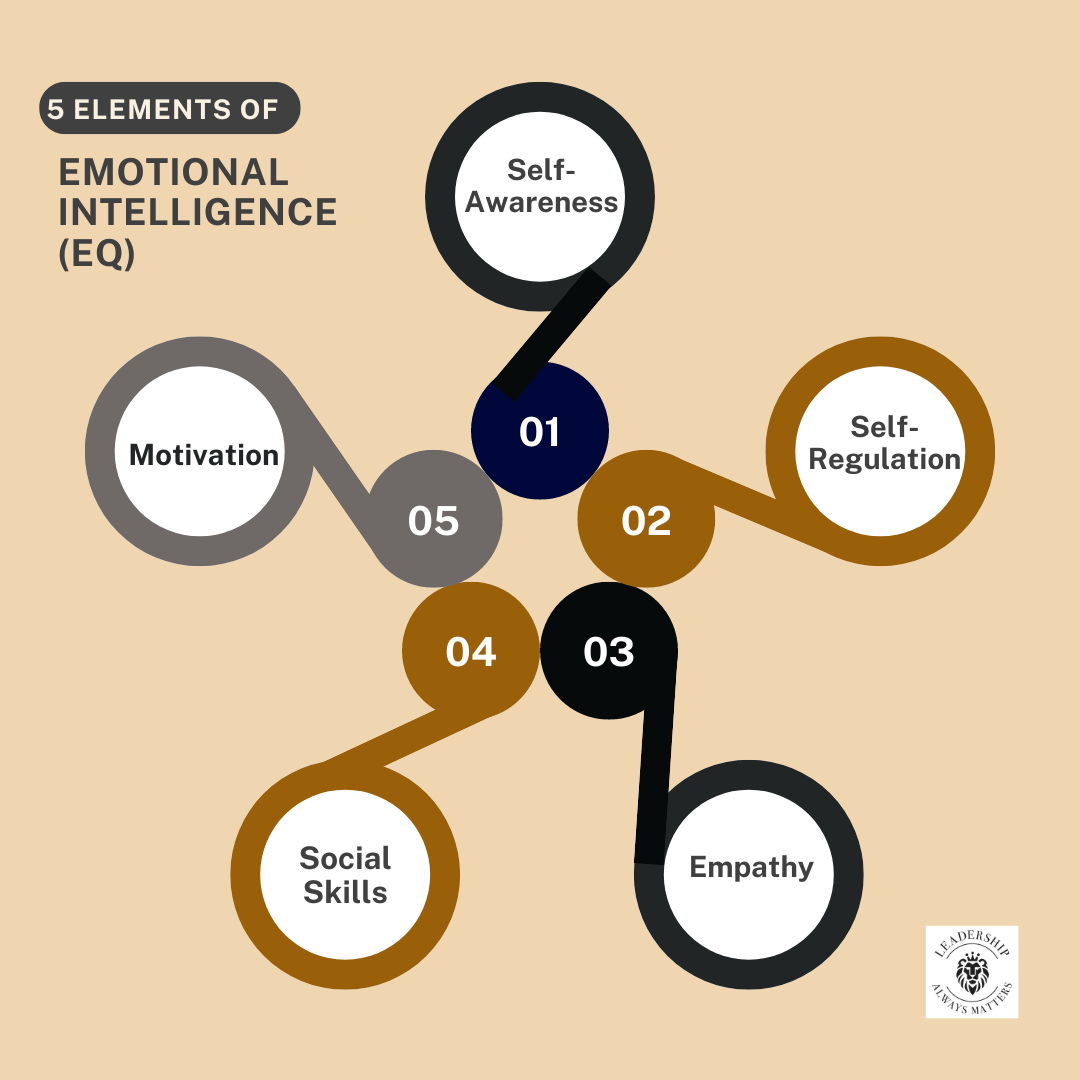5 Strategies to Harness Emotional Intelligence
Before we begin…
In a previous article I wrote about resilience, and briefly touched on emotional intelligence, —-so there’s a very small section of that article here.
Let’s Talk Leadership!
What is Emotional Intelligence (EQ)?
The ability to recognize, understand, manage, and influence your own emotions and those of others. It’s about self-awareness, self-regulation, empathy, social skills, and motivation. People with high EQ can navigate social complexities, handle interpersonal relationships judiciously, and make better decisions under pressure. They are able to build trust and inspire, making EQ key to effective leadership.
Do you know leaders who manage their emotions and stay composed under pressure are more effective?
Yes, leadership and EQ are closely related because effective leadership often relies on understanding and managing your emotions and those of others. Leaders with a high EQ tend to be more empathetic, self-aware, and better at handling stress They communicate clearly, resolve conflicts, and build strong, relationships.
Daniel Goleman, the well known EQ author, wrote about the 5 key EQ components:
Self-awareness: Self-awareness helps to the understanding of emotional triggers. Thus, leaders are able to lead more authentically and adjust their behavior when necessary.
Self-regulation: Emotionally intelligent leaders are better able to manage their emotions and remain calm under pressure. They try to prevent impulsive reactions that could negatively affect others.
Empathy: Leaders understand and care about the emotions and perspectives of others, which helps them connect and motivate.
Social Skills: Strong interpersonal skills allow leaders to communicate effectively, manage relationships, and navigate social complexities in their companies.
Motivation: Self-motivation is critical for leadership. Driven leaders are passionate, dedicated, and highly focused on achieving goals. They are optimistic and succeed at lifting employee morale.
In essence, EQ enhances leadership by enabling better decision-making, fostering a supportive culture, and encouraging a more adaptable, resilient, approach to challenges.
Do you know…?
About Starbucks and Howard Schultz’s leadership? It’s a well-known case exemplifying the use of EQ to resolve conflict. The company was struggling back in 2008, and lost its connection to its core values. Employee morale was low and customers were not feeling the warm, welcoming experience Starbucks committed to. Schultz had stepped down as CEO in 2000, but this led to his return. When he returned— he used an approach grounded in EQ to turn things around.
Self-awareness and Empathy
Schultz knew Starbucks had strayed from its original mission, and used empathy to reach employees and customers. He publicly acknowledged the company’s mistakes and expressed a genuine desire to reconnect with it’s employees and the community. His honesty helped rebuild trust.
Open Communication
He organized open forums for employees to express their concerns. By listening to their frustrations and ideas, Schultz showed he valued their input, which helped him restore employee morale and motivation.
Managing Emotions and Relationships
Schultz remained composed and focused during this time of immense pressure. He carefully managed his own stress while creating a sense of urgency for the company to adapt, without letting panic spread throughout the organization.
Long Term-Decision Making
Schultz made tough decisions. Rather than just focusing on short-term profits, he closed 7,100 stores for a day to retrain baristas. He made sure they were properly trained to deliver the best experience. This move was symbolic and showed a commitment to quality and everyone’s well-being.
By leveraging emotional intelligence, Schultz was able to lead Starbucks through a difficult time, rebuild trust, and restore the company’s success. His empathetic and transparent leadership helped manage conflict and re-establish a shared sense of purpose.
Emotional Intelligence
How Can I Become More Emotionally Intelligent?
Becoming more emotionally intelligent involves developing greater self-awareness, improving your ability to manage emotions, and strengthening your interpersonal skills.
Here are some practical ways to increase your EQ.
Increase Self-awareness
Reflect regularly: Take time daily to reflect on your emotions, thoughts, and actions. Consider why you feel certain emotions in specific situations.
Identify triggers: Pay attention to what events, people, or circumstances tend to trigger strong emotional responses, and work on understanding why.
Seek feedback: Ask trusted friends or mentors for honest feedback about how you come across emotionally or how you handle stress.
Practice Self-Regulation
Pause before reacting: When you feel a strong emotion, (anger or excitement) take a moment to breathe and consider how best to respond.
Manage stress effectively: Find techniques that help you handle stress. Exercise, meditation, or even deep breathing can help. Remember— keeping calm under pressure improves decision-making.
Develop emotional resilience: Work on bouncing back from setbacks by reframing challenges as opportunities to grow, rather than seeing them as failures.
Cultivate Empathy
Listen actively: Focus on truly understanding what others are saying—-without jumping to conclusions. Make sure you are not thinking about your response while others are speaking.
Put yourself in other’s shoes: Try to imagine how others are feeling, and consider their emotions when making decisions that might affect them.
Ask Questions: When someone shares their feelings, ask follow-up questions to better understand their perspective.
Improve Social Skills
Communicate clearly and respectfully: Be mindful of what you say and how you say it. Be assertive without being aggressive, and use “I” statements to express how you feel.
Build relationships: Focus on building trust and rapport with those around you. Be approachable. Show genuine interest in others, and offer support.
Handle conflict calmly: When conflict arises, stay calm and try to understand both sides before reacting. Use empathy to find common ground and work towards a resolution.
Increase Motivation
Set personal goals: Develop a sense of intrinsic motivation by setting meaningful personal and professional goals. When you’re clear about your purpose, it’s easier to stay positive and focused.
Celebrate small wins: Acknowledge progress along the way. It can boost your emotional resilience and motivation to keep going.
Building EQ is an ongoing process. Practice self-reflection, empathy, and relationship-building. You’ll notice improvement in your ability to handle emotions and you’ll foster stronger connections with others.
Have a good weekend!
—Dr. Aguilar



